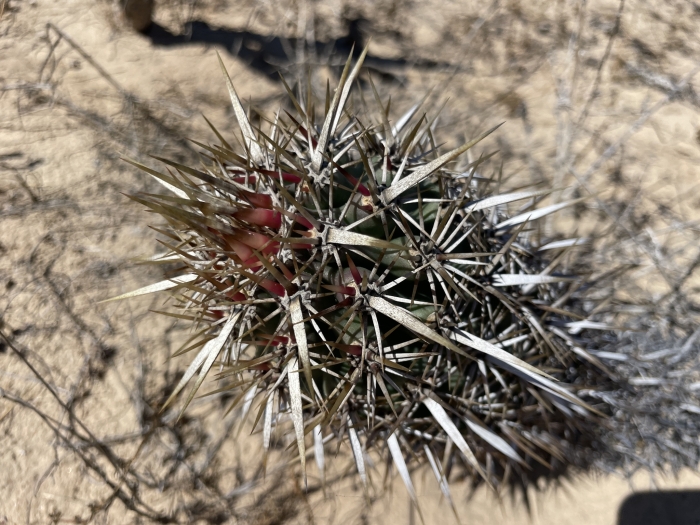Creeping Devil
(Stenocereus eruca)
Creeping Devil (Stenocereus eruca)
/
/

Sula Vanderplank
CC BY 4.0
Image By:
Sula Vanderplank
Recorded By:
Copyright:
CC BY 4.0
Copyright Notice:
Photo by: Sula Vanderplank | License Type: CC BY 4.0 | License URL: http://creativecommons.org/licenses/by/4.0/ | Rights Holder: Sula Vanderplank | Publisher: iNaturalist | Date Created: 2023-11-18T18:53:30Z |

























Estimated Native Range
Summary
Stenocereus eruca, commonly known as the creeping devil, is a slow-growing cactus native to the arid, sandy plains and dunes along the central Pacific coast of Baja California Sur, Mexico. This species is adapted to a desert environment, where it forms extensive colonies. It is a unique cactus with long, prostrate stems that can reach lengths of several meters, with the terminal end raised slightly off the ground. The stems are a creamy green color and are covered in formidable spines. The creeping devil blooms at night, producing large, showy flowers that can be white, pink, or yellow, followed by spiny fruit. It is a clonal plant, propagating by detaching stem segments that root and grow into new individuals.
The creeping devil is valued for its unusual growth habit and striking appearance, making it a fascinating specimen for cactus enthusiasts and desert gardens. It requires minimal maintenance once established and is drought-tolerant, thriving in full sun with well-draining sandy soil. While it can grow over 24 inches per year in its native moist marine environment, it grows much more slowly under arid conditions. In cultivation, it is important to mimic its natural habitat to prevent rot and other moisture-related issues. Despite its slow growth, this cactus can eventually cover large areas, so space should be considered when planting. It is not commonly used in urban planting due to its spiny nature and sprawling growth habit.CC BY-SA 4.0
The creeping devil is valued for its unusual growth habit and striking appearance, making it a fascinating specimen for cactus enthusiasts and desert gardens. It requires minimal maintenance once established and is drought-tolerant, thriving in full sun with well-draining sandy soil. While it can grow over 24 inches per year in its native moist marine environment, it grows much more slowly under arid conditions. In cultivation, it is important to mimic its natural habitat to prevent rot and other moisture-related issues. Despite its slow growth, this cactus can eventually cover large areas, so space should be considered when planting. It is not commonly used in urban planting due to its spiny nature and sprawling growth habit.CC BY-SA 4.0
Plant Description
- Plant Type: Succulent
- Height: 0.5-1 feet
- Width: 1.5-4 feet
- Growth Rate: Moderate
- Flower Color: Pink, White
- Flowering Season: Summer, Fall
- Leaf Retention: Evergreen
Growth Requirements
- Sun: Full Sun
- Water: Low, Medium
- Drainage: Fast, Medium
Common Uses
Border Plant, Drought Tolerant, Low Maintenance, Rock Garden
Natural Habitat
Arid, sandy plains and dunes along the central Pacific coast of Baja California Sur, Mexico
Other Names
Common Names: Creeping Devil, Coachwhip cactus, Caterpillar Cactus, Cherinole, Chirinole, Creeping Devil Cactus, Chirinola
Scientific Names: , Stenocereus eruca, Cereus eruca, Lemaireocereus eruca, Machaerocereus eruca, Rathbunia eruca,
GBIF Accepted Name: